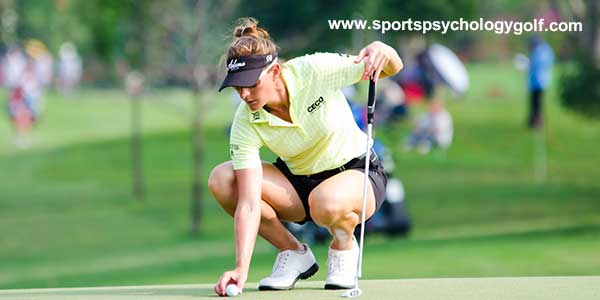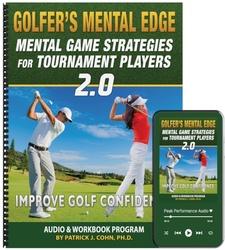
Moving on After Mistakes
Are you a golfer who gets down on yourself after a bad shot? Well, you are not alone!
Golf is a challenging game and every course has a unique design of bunkers, water hazards, trees, and other features.
With all the challenges… slices, duffs, bogeys and other mistakes are evident over the course of 18 holes. No wonder golf is referred to as an imperfect game.
Being positive throughout an entire round of golf is unrealistic. No golfer is excited when they see their tee shot land among the trees. No golfer is happy when they miss an easy 2-foot putt. No golfer is psyched after two consecutive bogeys.
Sometimes, we trip ourselves up with the notion of positivity. We think we need to be positive after a bad golf shot, feel good to be our best. We think positive and negative are the only emotional responses after a bad shot.
We know what positive feels like, happy, excited, energized. We wonder how it is possible to feel these feelings after the ball landed in the bunker. And we believe we NEED to be positive to play our best.
This is not true, there is another thought process or different mindset that is more important… neutrality. Neutrality is the middle ground. Neutrality is not being too high or too low. Neutrality is focusing on what needs to be done.
Refocusing After a Mistake
When mistakes happen, you should find a way to recover mentally and get back on track quickly. Think of it in the same way as a recovery shot… A recovery shot is when you play a shot from a difficult lie, such as a hazard, and bring the ball back into a more favorable position.
You can apply this same “recovery” concept to your mental game. After a bad shot, it is important to mentally “recover” as quick as possible to change your focus to a more favorable mindset.
A more favorable mindset does not necessarily mean a positive mindset. A neutral mindset will help you switch gears and divert your attention away from negative thinking and negative emotions.
When your mindset is neutral after a good or bad shot, your focus is on how to play the next shot. The neutral mindset helps maintain an even keel or emotional balance.
A neutral mindset helped Collin Morikawa stay focused and maintain an even keel through three playoff holes en route to winning the 2020 Workday Charity Open.
Morikawa won his second PGA victory after rallying back late in the round.
COLLIN MORIKAWA: “I’m a pretty neutral guy. I like to stay on that positive side… If I have a bad hole, move on to the next. You can’t do anything about what has happened. You did it, learn from it. It’s all about learning, and then go on to the next shot and hit a great approach shot, go make a putt, do whatever.“
Negative reactions are normal, but how quickly you can move on from the negativity impacts your overall score.
Developing a Neutral Mindset
Combine a ‘what if’ strategy with visualization. Think of a likely scenario that usually throws you off your game. Create an ‘if-then statement for example, “If I land in the rough, I will… focus on getting the ball back into play or on the green”
Rehearse yourself recovering mentally from a bad shot and play out a mental recovery in your mind.
Remember that your reaction is a choice. If you can make the right mental choice, you will improve your golf score.
Related Golf Psychology Articles
- The Mindset of Charging From Behind
- What is a Positive Attitude in Golf?
- Mindset and Performance Ruts in Golf
- Subscribe to The Golf Psychology Podcast on iTunes
- Subscribe to The Golf Psychology Podcast on Spotify
Golfer’s Mental Edge 2.0

Do you suffer from fragile self-confidence after missed hitting shots or making mistakes, playing with strict or high expectations that undermine confidence, or the inability to play freely and relaxed on the course?
Successful golfers have learned how to perform with ultimate confidence in competition, so we’ve developed The Golfer’s Mental Edge 2.0 Workbook and Audio program to help you do this!
The Golfer’s Mental Edge 2.0 program includes the top 11 mental training sessions I do with my personal students to help them boost their mental game and improve consistency on the course!